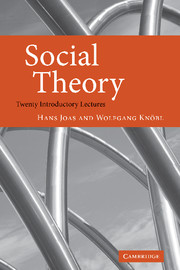Book contents
- Frontmatter
- Dedication
- Contents
- Introduction
- I What is theory?
- II The classical attempt at synthesis: Talcott Parsons
- III Parsons on the road to normativist functionalism
- IV Parsons and the elaboration of normativist functionalism
- V Neo-utilitarianism
- VI Interpretive approaches (1): symbolic interactionism
- VII Interpretive approaches (2): ethnomethodology
- VIII Conflict sociology and conflict theory
- IX Habermas and critical theory
- X Habermas' ‘theory of communicative action’
- XI Niklas Luhmann's radicalization of functionalism
- XII Anthony Giddens' theory of structuration and the new British sociology of power
- XIII The renewal of Parsonianism and modernization theory
- XIV Structuralism and poststructuralism
- XV Between structuralism and theory of practice: The cultural sociology of Pierre Bourdieu
- XVI French anti-structuralists (Cornelius Castoriadis, Alain Touraine and Paul Ricoeur)
- XVII Feminist social theories
- XVIII A crisis of modernity? New diagnoses (Ulrich Beck, Zygmunt Bauman, Robert Bellah, and the debate between liberals and communitarians)
- XIX Neo-pragmatism
- XX How things stand
- References
- Author index
- Subject index
- References
References
Published online by Cambridge University Press: 05 June 2014
- Frontmatter
- Dedication
- Contents
- Introduction
- I What is theory?
- II The classical attempt at synthesis: Talcott Parsons
- III Parsons on the road to normativist functionalism
- IV Parsons and the elaboration of normativist functionalism
- V Neo-utilitarianism
- VI Interpretive approaches (1): symbolic interactionism
- VII Interpretive approaches (2): ethnomethodology
- VIII Conflict sociology and conflict theory
- IX Habermas and critical theory
- X Habermas' ‘theory of communicative action’
- XI Niklas Luhmann's radicalization of functionalism
- XII Anthony Giddens' theory of structuration and the new British sociology of power
- XIII The renewal of Parsonianism and modernization theory
- XIV Structuralism and poststructuralism
- XV Between structuralism and theory of practice: The cultural sociology of Pierre Bourdieu
- XVI French anti-structuralists (Cornelius Castoriadis, Alain Touraine and Paul Ricoeur)
- XVII Feminist social theories
- XVIII A crisis of modernity? New diagnoses (Ulrich Beck, Zygmunt Bauman, Robert Bellah, and the debate between liberals and communitarians)
- XIX Neo-pragmatism
- XX How things stand
- References
- Author index
- Subject index
- References
- Type
- Chapter
- Information
- Social TheoryTwenty Introductory Lectures, pp. 561 - 591Publisher: Cambridge University PressPrint publication year: 2009



